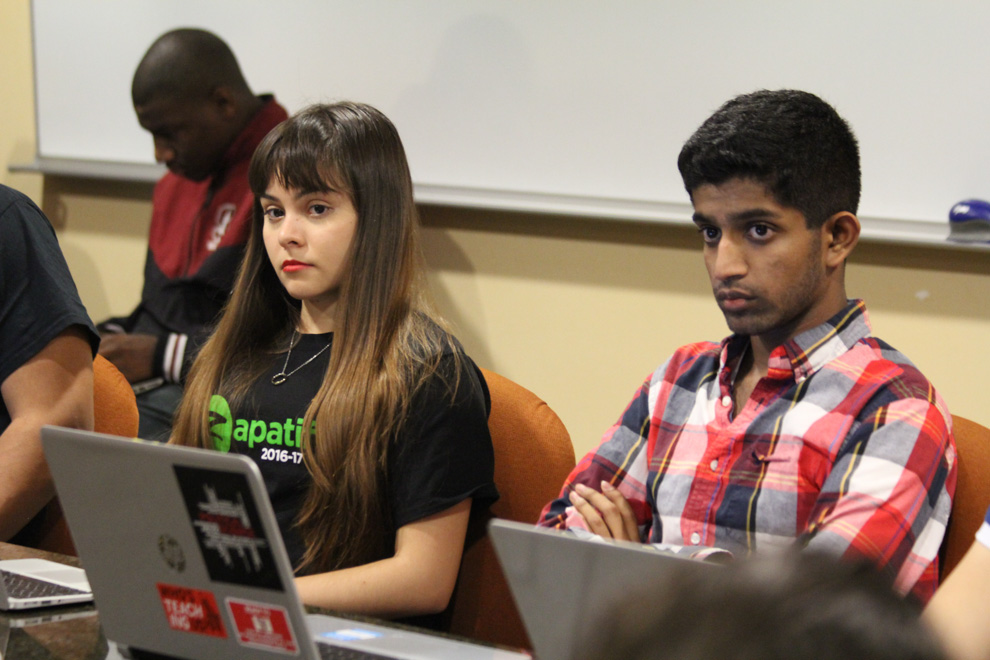At a closed meeting and a brief public gathering on Tuesday, several members of the 18th Undergraduate Senate said they felt under-informed about the financial health of Stanford Student Enterprises (SSE) due to the lack of financial data from the organization. Issues of national politics and elections also became a topic of interest during the following joint meeting with the Graduate Student Council (GSC), and the Senate discussed diversity initiatives.
SSE discrepancies and changes to annual grants
Senators expressed concern with the lack of financial data presented by SSE Chief Executive Officer Jelani Munroe ’16 during their closed meeting.
Senators said that the CEO seemed opposed to sharing information on financial statements, and that he claimed that “everything is fine” without collecting data. Specifically, senators had unaddressed questions on financial statements regarding the Student Store.
“He is not inspiring confidence in his doing his job effectively,” anonymous senators said.
Regarding Senate funding, appropriations committee chair Cenobio Hernandez ’18 notified the Senate about a change in the annual grants process that requires student groups to verify the reason for funding on every listed item. Hernandez emailed student group financial officers, presidents and vice presidents about how to apply.
“We want to ensure that every dollar is being spent on something,” Hernandez said.
Hernandez also suggested using Facebook as an interactive portal to answer questions live on the annual grants process.
Elections and endorsements
During their discussion of the upcoming ASSU selections, the GSC and Senate argued against a proposal to list candidate endorsements on the new ballots. Senator Matthew Cohen ’18 was concerned that the addition of endorsements would encourage voters to look solely at the names of endorsing groups instead of the individual candidates.
“I think that’s a big problem with American politics right now: that people are voting for the party and not the person,” Cohen said.
Senator Hattie Gawande ’18 agreed and said that adding endorsements should be powerful enough without being added to the ballot.
“Really powerful endorsements come from the organization itself,” Gawande said. “It seems like the vogue thing to do and I don’t want to encourage that.”
Political and apolitical stances
Senators and GSC leadership argued on the council’s role in voicing political and national election opinions to the student body. Senator Jayaram Ravi ’19 said that it was the Senate’s job to express their political stances.
“We should not be endorsing candidates that have direct impact on Senate,” Ravi said. “But we need to talk about these issues. That’s why we were elected to Senate.”
Senator Gabe Rosen ’19 disagreed, saying that Senate should be conscious of national political stances but should focus efforts on movements and changes that directly affect students.
“The most real-world relation that I can express is that members of the [Senate] should focus [on the] welfare of people directly related to that body,” Rosen said.
GSC representative Jennifer Hill, a fifth-year Ph.D. student in sociology, argued that national issues affect the student body, and therefore it was the representative body’s job to take a stance on political issues. Senator Jasmin Espinosa ’18 agreed, adding that national movements affect all members of the student body differently and personally.
“You can’t separate the ‘political-ness’ from the individual,” she said. “Our voice could be a huge, huge help not only for students at this school but also at other places.”
Senate encourages diversity
Rosen proposed a follow-up to the Full House bill approved last fall, which will fund extracurricular program participation for financially needy students. Rosen and Deputy Chair Mylan Gray ’19 will collaborate with the Diversity and First-Gen (DGEN) office to create an incentives program for student organizations that “foster inclusivity” for all members.
“We want to publicize those groups who embody these principles, who show that they are taking concrete steps to address these issues,” Rosen said.
Rosen said that they are also coordinating with the Office of Sexual Assault and Relationship Abuse (SARA) to add to the incentives that encourage education on assault prevention and discussion within campus communities.
Advocacy Committee Chair Espinosa said that the committee is working on recruitment sessions for underrepresented communities to run for ASSU offices. Espinosa said the goal of recruitment is to diversify student offices.
“We want to create a more representative Senate body,” Espinosa said.
Administrative office hours
Senate Chair Shanta Katipamula ’19 said she met with Vice Provost for Student Affairs Greg Boardman to discuss the efficacy of and possible changes to the administrative office hours that Senate and administrators started this quarter.
Senator TG Sido ’18 said the communications committee is working on a program to send out notifications about office hours.
“We want to get some sort of programming going so that we can say something like, ‘Hey, Harry Elam is having office hours now in this location, you should come out,’” Sido said.
Contact Gillian Brassil at gbrassil ‘at’ stanford.edu.
